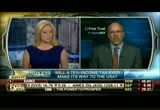tv MONEY With Melissa Francis FOX Business September 29, 2012 12:00am-1:00am EDT
12:00 am
every year? even when they say it's not, it's always about money. melissa: let's first take a look at the day's market headlines. stocks closing out september and the third quarter to the downside. the stocks pulled back from session lows after most of spain's banks passed a critical set of stress tests. the dow fell 48 points. oil prices posted the biggest quarterly gain since the fourth quarter of 2011. over the past three months, crude prices have risen 8.5%. bank of america is shelling out $2.43 billion. the bank will settle claims it misled investors during the 2009 acquisition of merrill lynch. shares of bank of america closed down about 1 1/2%. now to our top story tonight. no matter what you are paying in taxes right now, it's got to be better than this.
12:01 am
75% is now what the wealthiest citizens in france have to pay their government. that is, thank you, to the country's socialist president. there he is. he looks so happy, doesn't he? how would you feel about giving 75% of your income to uncle sam? for now that insane tax rate is staying on the other side of the pond. i don't know, are we next? joining me for more on this, chief economist brian wesbury. brian, great to have you back on the show and i just fear that there are folks in washington who look at this and say, now, that french thinking, they are thinking right. scary, right? >> yes. we know they like a lot of things that the french like. big government. big spending. big entitlement programs. and this is the last gasp. i call this paul krugman's alamo. i guess if you're going to talk european we have to say it is the waterloo, right? melissa: right. >> we spent all the money. we can't afford it.
12:02 am
now we'll tack, we're going to confiscate people's income to try to pay for all of this. what they will do is destroy their economy. so this will be, this will be the end for france. this can't last. hollande, i can't man he is president for much longer because, because his popularity is plummeting. >> kind of depends on who is, who is out there voting. whether or not they support it. in france there are a whole bunch of people are looking to leave. super victoria supermodels say they will leave the country. >> right. melissa: the head of lvmh will leave the country. ceo of beauty companies saying that they're going to, they're going to have a really hard time, recruiting, l'oreal, will have a hard time recruiting executives because why would somebody come to france and work if giving away 70% of the income. there you go. that is everybody racing for the door. >> right. they have raised tax rates
12:03 am
across the board. 41% rate went to 45. they now have a higher tax rate than the average european tax. remember, airbus is in france. so, and part of this tax hike they're taking away the ability of corporations to deduct interest on their debt, which every country allows around the world. airbus is going to become uncompetitive. how can you hire an engineer when their tax rate is higher in france than it is say, in the united states? plus the corporation is falling behind because their tax rates are going up. their businesses will go away. they will lose competitiveness. people will move, as you have just said. this is a disaster. there are things you can't see. you know, so let's say you're a surgeon and you don't want to pay 75% tax rate. so what you do, you cancel surgeries and go paint your own house, which takes away business from the painter. and the whole economy becomes inefficient.
12:04 am
that is why, this is going to be a disaster for france. the whole world learned these kind of tax rates are highly unproductive. melissa: i don't know. they will have to watch closely to really learn that lesson because i'm not sure everybody takes that away. one of the biggest points whenever you do something like this it never brings in revenue they think it will going to. they think this will recoup 30 billion euro or $39 billion and help close the deficit next year. if you look at example. this was tried in oregon in 2010. it didn't bring the revenue they thought. tried the same experiment in illinois. didn't bring in the revenue they thought. do you think down the line though, somebody will have a scorecard and say this is what you thought it would bring in but it didn't happen? >> well they will have to, melissa. so initially, you're absolutely right. initially when you raise taxes, remember we're halfway through a tax year. so you can't, you can't move today and not claim you earned that money in france.
12:05 am
so people will have to pay higher taxes this year. so they might have a little bit better of a budget over the next 12, maybe, 18 months. but after this, things start to fall apart. but more importantly, businesses are going to see growth slow down and they're going to have to lay off workers. this is where the polls and the politics starts to work against the president. melissa: i worry this is where it comes home to the u.s. because immediately today all across the news when people were reporting this story i say in france the top income bracket will pay 75%. that compares to 35% in the u.s. comparatively that looks small and invites an increase in taxes. also not fair to look at the federal tax in isolation. the top income bracket doesn't pay 35%, they pay a lot more when you layer in state, local and other property taxes and everything else you're paying. do you think this invites the same tax in the u.s. is my concern? >> i am certain that paul,
12:06 am
krugman, for example would love to bring a 75% tax rate to the united states. he wouldn't really want to pay it. and by the way, we now allow people, voluntarily pay whatever they want. melissa: right. >> but in the end, in his economic models he thinks this makes sense. so i am sure that we will have this debate, or at least somebody propose something like this in the united states. i highly doubt that we will ever see a rate above 40% anytime in our lifetime. melissa: you and paul have such a beef going now. i would like to see a rumble in the jungle type thing. maybe you need a boxing match. a debate at the very least. you guys have a little tiff going there. thank you for coming on. have a great weekend. >> absolutely, melissa. melissa: hear is the question of the day. what would you do if a 75% income tax was imposed on the u.s.? one of the best facebook responses from you, quit looking. what's the point.
12:07 am
facebook.com/melissafrancisfox. follow me on twitter, melissaafrancis. i would leave the country and go to bermuda. why not. very nice there. here is good news. despite pressing news about the economy america's rich are feeling more confident. only 30% of those surveyed considered conservative investors. that is down 36% a year ago. despite really troubling economic numbers coming out this week and especially today from the chicago business barometer showing business activity in the u.s. fell to the lowest level in three years. here with more is managing director of acm wealth management. thank you so much for joining us. it is hard for me to believe, investors, no matter how much money they have are feeling more confident and less risk-averse. are you seeing that in practice? >> you know, i really am. thanks for having me here today, melissa. i think part of it is just
12:08 am
human nature. we're, three or four years removed from the bottom of the market and. in early 2009 and we've seen the s&p, you know, rebound from a low of somewhere around 66 to where we are today -- 666. it is only human nature for us to feel better. 401(k)s are worth more. our investments are worth more. melissa: but your house is worth absolutely nothing. wages are stagnant. it just super wealthy and quantitative easing and all money printing and everything that everyone in washington done to help the very rich because equities gone up? other than that it hasn't been a real gain in wealth. >> no. i mean, you're exactly right. i think to a certain extent there is feeling of the rich just keep getting richer and everyone else is still struggling. and obviously the high unemployment numbers, you know would suggest that. melissa: i mean, all the quantitative easing out of
12:09 am
the fed definitely helping the stock market. whatever you think of president obama and politicians currently in washington it is helping wealthiest individuals right now what they're doing i guess. i wonder, does this, is it really feeling more confident though, or is it just, this is the new normal and sort of investors are saying it is not going to get that much better from here. so i have to find a way to try to make some money somewhere where i have to be pushed out into riskier assets to try to make money? >> personally i really don't like that phrase, the new normal. history has shown that the stock market, the, you know, the economy, it all runs in cycles. so we're just in a particular cycle right now. but, i think to a certain degree people do feel better than they did a few years ago when things were much worse. obviously yeah, there is still a lot hanging over us in terms of, you know, the debt ceiling, high unemployment, what is going on in europe, so, you know, i would like to say that
12:10 am
people are probably, if anything, more cautiously optimistic. melissa: yeah. why are they feeling better though besides the stock market? what else could you point to that is doing well? >> personally, real estate is doing better. as i drive around here in charlotte, you're seeing more homes selling. you know, i'm reading about the prices are ticking back up a little bit. there has been foreclosed homes that have been sitting there for, you know, months, if not years, that all of sudden i'm seeing buyers moving in. so, even though real estate isn't where it was back in 2006, it is getting better. melissa: prices are still 36% lower on a national average since 2006. you haven't made it back to that level. >> you're comparing to a year or two ago or what you thought although there are still so many people underwater. i don't know i'm not sure it makes that much sense to me but, tony, thanks for coming on. we appreciate your time. >> you bet, thank you. melissa: an online video sparks a firestorm over free
12:11 am
cell phones for lower income americans. congressman trying to save consumers from shelling out $1.6 billion in fees much joins us with his plan next. that is someone with one of the free phones there. this is youtube video. we'll explain what this is all about, coming up. plus the chicago school district already caved into its teachers union. now we have to shell out even more money to save financially afloat? we'll explain that coming up on the other side of this break. ♪ [ male announcer ] let's say you need to take care of legal matters. wouldn't it be nice if there was an easier, less-expensive option than using a traditional lawyer? well, legalzoom came up with a better way. we took the best of the old and combined it with modern technology. together you get quality services on your terms, with total customer support. legalzoom documents have been accepted in all 50 states, and they're backed by a 100% satisfaction guarantee.
12:15 am
♪ . melissa: so you want to know one of the reasons your cell phone bill is so high? part of it is because every month you pay a free to help give free cell phones away to lower income americans. believe it or not in 2011 that tab is $1.6 billion. it is part of the lifeline program and began 20 years ago. but back in the headlines because of this clip on youtube that everyone is watching. take a look. >> got obama phone? >> everybody in cleveland, all minorities got obama phones. keep obama as president you know. he gave us a phone.
12:16 am
>> gave you a phone? how did he give you a phone? >> you sign up. you on food stamps, social security, low income, disability. melissa: wow that is not really fair. that program has been around for a while. congressman tim griffin from arkansas is trying to revamp the program and take cell phones out of it. congressman, thanks for joining me. yeah. so talk to me about this program. it is called the universal service fund is a fee that you see on your bill. that is how it is collected. what is your problem with this program? i can certainly see the safety benefit. it was started a long time ago to put land lines into homes of low income folks. that made a lot of sense from safety perspective. >> sure. my bill does not touch the land line portion. you're right, to say that the land line portion, the lifeline program, more broadly has been around for a long time but the cell phone component is relatively new. and you didn't have a lot of
12:17 am
abuse with the land line program because, who wants 10, 20 land lines in their home? no one. it was when it was converted or, expanded to allow for cell phones that you started seeing the calls skyrocket. you have really two things going on here. first of all, you have the issue of people getting more than one cell phone. 10, 20, 30, 40 cell phones using them, as barter, selling them, that sort of abuse has been documented all over the country. the other thing is, i have a fundamental problem with the federal government providing smartphones to people. these are not phones that can only call 911. these are phones that have texting capabilities sometimes. they're smartphones or blackberries. they have cameras on them.
12:18 am
and i just don't think the federal government ought to be in the business of providing that. melissa: certainly not. the way it is right now, are there no limits on the types of phones that you can get in this program? go ahead. >> well, here's the deal. the service is what the government pays for. melissa: okay. >> the cell phone, the companies, private sector companies, because the way it is set up, they actually provide the phones. i've had constituents get phones in the mail that they never even applied for. but here's the thing. a lot of folks say, well, hey, these are, these are necessary in today's times. and i say to them, well, first of all, there are very few people who can't afford a basic phone, like a cricket phone. you can get those for 10, 20, 30 bucks a month. but the broader issues, that i, tried to address to folks is, there are a lot of things like jumper cables
12:19 am
and first aid kits for cars, what have you that would be great if everyone had them but the federal government shouldn't be providing that. melissa: no, in fact lots of local stations like to do stories all around the country about the abuse of these. one station in baltimore found a lady with three cell phones in her purse. collected 30 phones in total from the program. the video we were watching on youtube, the woman is bragging about obama phone. that is not completely fair. this is program that has been in existence for a long time. you know, between 2009 and 2008, they were already giving out phones that were not land line based. although the cost has gone up dramatically. >> right. melissa: if you look at the program was about a billion dollars in 2009. by 2011, it had expanded to $1.6 billion. so obviously more than 50% growth there in two years. why are we seeing this kind of expansion? and what would you change about this exactly? >> well, what my bill, what
12:20 am
my bill does basically takes it back to a land line program. it gets rid of the cell phone component completely. why are we seeing this? we're seeing it partially because there are a lot more people who are, who qualify by getting disability, or other sorts of government benefits. but we're also seeing it because there's been a really aggressive advertising and marketing campaign around this just to get more of them out there. the private sector companies, they get money everyone they sign up, they get a bit of money for the service from the government. and so their incentive is to sign up as many people that they can get. melissa: yeah. congressman, we're out of time but thank you for your points. we appreciate it. we'll keep an eye on this issue. thanks for coming on the show. >> thank you very much.
12:21 am
melissa: so the kids are back in school but folding to the teachers union may even be more costly to the city of chicago. we'll explain that coming up next. plus, phoenix's mayor goes on food stamps for a week. taxpayers spend billions of dollars a year on the program. are they getting their money's worth. the mayor will join us with the details of his week on food stamps. do you ever have too much money? ♪ ♪ chances are, you're not made of money, so don't overpay for motorcycle insurance. geico, see how much you could save.
12:25 am
12:26 am
adjustments to close an estimated one billion dollar budget gap for fiscal 2014. the major problem that if there are more strikes around the country this could end up happening in your city. joining me christina rasmussen, executive vice president of the illinois policy institute. thank you for joining us and you know, let's get right to it. what does this mean for chicago as it has to borrow more money? >> well it is going to mean higher interest costs if the school district does skied decide to go for row. you're absolutely right, the fiscal news is very grim. they knew they would have a one billion dollar deficit last year. on top of that they will add unscheduled pay hikes negotiated by the union. the situation is getting worse and getting worse quickly. melissa: you say if they decide to borrow. what else could they do? >> there aren't too many options. the revenue option is basically shut down. chicago property taxes are high. the growth is capped.
12:27 am
chicago already increased excise taxes and allocated money elsewhere. not like the state government can come riding to the rescue. everyone knows illinois is broke. a federal bailout would have a lot of problems. it is unclear how the district will solve its mess. melissa: they pay 3.5% to borrow which may or may not sound like a lot, but if you compare to other places they pay 1.5% and some say that could go all the way up to 5% because they don't look responsible in their finances to the various bond rating agencies. do you think that is the case that, it could go up to five? >> you know it could go up. problem of rising interest rates and pool of discouraged buyers. folks know that chicago teacher's union leadership essentially run the district. they came in and threw their weight around and got a deal not financially stable. if those are folks running the show, people will be leery on betting on chicago
12:28 am
public schools. melissa: in their defense the chicago public schools put out a statement saying over the past year we cut more than half a billion dollars all outside the classroom. we know this isn't enough to undo years of revenue losses as misplaced priorities. they say, they go on to say, say that like it is has been somebody else who spent all of this money and here they are the ones that are currently agreed to this tax hike, to this pay hike in order to end the strike. >> yeah. mayor rahm emanuel agreed to a contract he knew that the city could not afford. it is pretty clear there will be some blunt instruments used to try to cut costs. we're talking about a significant number of school closing. big layoffs. neither of which is good for chicago and chicago kids. but when you agree to contracts that you can not begin to afford, there are going to be consequences. melissa: what do you think is the lesson that other school districts around the country take away from this? do you think other teachers see this and say, you know,
12:29 am
those teachers were tough. they went out on strike, we should do the same thing? or do you think other taxpayers around the country see this and say look and borrowing costs go up? what is the lesson? >> the lesson is that you shouldn't kill the golden goose. if your union pushes so much, that you essentially set up a system for failure just because what you have right now isn't sustainable, in the long run that will hurt you as a teacher. because your job will be on the line when the money runs out. let alone your pensions. so don't kill the golden goose. come up with a system sustainable. don't push just to throw your weight around. melissa: the flipside the reason the rate goes up more likely the district would default or reason why their credit rating goes down. do you think it is likely they would actually default on this debt? >> that would be horribly disrupting. it. i certainly hope illinois doesn't go in that direction and i hope we turn it around but what you're seeing out of chicago, what you're seeing from state government
12:30 am
in springfield isn't encouraging right now. melissa: thanks for coming on the show. have a great weekend. >> thanks. melissa: phoenix's mayor puts himself on food stamps. is the program worth tens of billions dove lars taxpayers spend on it every year? the mayor joins us coming up. piles of money coming up after this break. ♪ .
12:34 am
♪ . melissa: so a lot has been said lately about the record number of people on food stamp. as of june, almost 47 million americans were enrolled in the federal program called snap which costs taxpayers $75 billion a year. but reports show that 3/4 of a billion in the program is lost to fraud. spent on things like tobacco,
12:35 am
plastic surgery, strip clubs. phoenix mayor greg stanton wanted to see how it all worked. he ditched his usual routine and lived off food stamps for a week. the mayor joins me now. what was it like? >> it was tough. i only had $29 was my total budget for one week which is exactly what someone who is living on food stamps. that is their total budget. and it was tough. i could not get anything other than the very, bare minimum n order to meet budget i had to skip a few meals. it was a tough thing. in fact i lost a few pounds. hopefully makes me a better policymaker. i was asked by a local group, american community action association which is a nonprofit that deals with folks living in difficult circumstances if i could take the challenge. i said sure. it would make me a better policymaker. it is the least i could do. melissa: there is big gap what you're talking about and all the other reports about the fraud that seems to be rampant in the program. for example, "l.a. times" did a report.
12:36 am
in a few months they saw $12,000 taken out in food stamps from an atm in strip club. i don't know what people use cash for in a strip club but i don't think it is fruits and vegetables. elsewhere in california there was a big investigation into food stamp money used for lottery tickets. in massachusetts a blue ribbon panel found it used on jewelry and cruises. where is the disconnect what you're talking about, very small amount of money, being stretched over the course of a week for food and all this fraud we hear about? >> all i can tell you is we're going through incredibly difficult economic times. this is the worst economy since the great depression. we're beginning to get, crawl out from underneath it. the economy here in phoenix is getting a little better but there are still a lot of people that used to be solidly middle class living under very difficult circumstances. including many who thought they would never be living on food stamps are living on food stamps n any government program there is small amount of abuse.
12:37 am
that is the vast minority of people. the vast majority of people are need a program to help them get through difficult times on a temporary basis. after this economy turns around they will be fully employed. i hate to criticize a program because there are some people abuse it. the vast majority of people are good, hard-working people that need it. i can only tell you if you play by the rules, under the food stamp program you don't get a lot, at least for food. the ones i'm really thinking about during last week were kids. i mean, skip a few meals, it is kids living through it. melissa: nobody wants kids to go hungry. when i see the abuse, i think that is money being wasted that could be feeding kids. i mean, when you went through it, what was the mechanism like for you to go in and exchange the, did you have a debit card? how did it work so that we can root out where the waste and even the fraud is to get more money to the right people? >> well, first off, let me be clear. what i did was, they gave me the budget. the dollar amount someone on
12:38 am
food stamps. i didn't sign up for food stamps only doing it for one week. they wanted me to experience what life was like for someone. you can't fully experience for one week. i could always pull out my debit card if i needed to. i don't want to overstate what i did. i wanted to show support and be a better policymaker. on that issue, if someone sees any kind of fraud or abuse, call the local law enforcement authorities. you shouldn't criticize an entire program which help as lot of people in need during incredibly difficult economic times. don't criticize an entire program because there is some fraud and abuse. every major corporation there has to be some fraud and abuse. it you had is be reported. should be enforced and people should go to jail abusing the ruse, the vast majority of people, the vast majority of people are good, hard-working people that need some help during these tough times. melissa: thanks for coming on the program. >> i appreciate it. anytime. melissa: you may not know it but foster care costs tax payers $9 billion a year.
12:39 am
12:40 am
12:43 am
♪ . melissa: now to a story about a program that is trying to save us from government waste. there are more than 400,000 children this foster care in the u.s. the average length of time is about two years. that costs taxpayers $9 billion a year. but an organization right here in new york has set up a system that cuts both the time kids are in foster care as well as how much it costs. in fact just last year they saved taxpayers more than $7 million in new york. with me is sue jacobs founder and director for center of family representation. how do you do this? how do you cut the cost and length of time immediately thinking that would put kids in danger? >> foster care is not what we normally may think of it as. it is for children who in fact, we think that children who are in foster care have
12:44 am
been abused and it is really not. it is a system set up for children who have been, what we call me glebted. it's really because their family resistive aring in poverty. they have got some challenges like let's say substance abuse or domestic violence and it's a way for jurisdictions to watch over the children but they're there for too long. melissa: if you're taking them out of the situation, isn't a dangerous situation that is a good thing they're out of it? that is a misconception? >> that is a misconception. melissa: what is the normalization situation where you would go in and say this was a mistake? give me an example. >> let's say, you would be surprised to learn that somebody with postpartum depression might lose their child to fosser care. people with low income and don't have enough resources to get supports for their families might wind up in that situation as one of our clients did. melissa: so what do you guys do? how do you save the money? >> we try to keep people out
12:45 am
of foster care all together and reduce lengths lengths of stay for children if they go into foster care. the way we keep people out of foster care. they have teams interdisciplinary and lawyers and parents and parents mentors for these families. also if our children go into foster care we are able to get them out in a much drastically reduced rate. our average last year was 2.5 months, compared to like two years. melissa: two years you cut it down to two months. why? you go into the home to find a way to make it safe? >> yes. we work very hard with the family to address the problems, to understand, and also provide services early and provide services that fit those families. melissa: how much money does that save typically and how are you paid? we're a show about money. what are the fans behind it? >> foster care in new york city state costs on average $29 per year per child.
12:46 am
actually that is one. lower rates. -- $29,000. children nationally are in foster care for two years but in new york state in foster care by 29 months. our teams reduce that by to 2.5 months. our one-time cost is $6,000 per family. melissa: $6,000 but from government fund as it sort of like an experimental program to try to cut down on the length of time? >> i wish we were paid fully by government but of course in times of tight government budgets we're not. we have a performance based contract with new york city which provides 2/3 of the cost. so we're a public/private partnership. and we really rely on the private part of that partnership to make that extra third. melissa: you know it is a really interesting experiment. we're always looking at ways to save taxpayer dollars and do a better job with these programs at the same time which seems to be what you're doing. thanks for coming on the show. >> thank you for having me. melissa: you remember the woman who paid seven bucks at a flea market for a
12:47 am
12:51 am
today we're joined by two fabulous attorneys. remi spencer, joey jackson. thanks for joining us guys. always fun on a friday. >> would not miss it. melissa: all right. we're starting with the money spare change update. you remember the woman who paid $7 for a box of stuff inside a flea market. inside she found that. it was a renoir worth $100,000 at least. i don't know i think it is worth more than that. turns out no spare change for her. the renoir was stolen at museum of art back in 1957. now the woman in bought it at flea market can't action it off. maybe get your seven bucks back. what do you think?. >> i think she is entitled to little more than $7. said they never had possession of this piece of artwork. then records later reflect that they did in fact have it. that it was reported stolen. that an insurance company paid out a at that00 claim for it. -- $2500 claim. maybe the insurance has a
12:52 am
legitimate claim to the fund or to the artwork. >> i'm with you. give her some money. the interesting thing, melissa, the fbi is investigating of they want to find the actual thief. remi and i defend people. they can't find thieves from seven weeks ago. are you kidding? good luck, people. melissa: maybe have the movie rights. when they find the burglar and whole thing would be like, yeah. >> she will need an agent to negotiate that. melissa: this is not fair. come on the show. we'll make you feel better. anyway, up next, a mom challenging the tsa over peanut butter a security agent at the airport confiscates her kid's peanut butter saying banned liquid or jell. what peanut but ther is liquid? they let her keep apple sauce and jelly more liquid like. the mom filed a claim with tsa. ended up get refund for $3.99 which was her cost of the peanut butter at whole foods. what do you think about this one? >> awesome.
12:53 am
absolutely. she motivated to file the claim. kept the receipt. this was all over peanut butter? could you imagine, melissa, like wheaties or something? she was motivated. >> i don't understand about this, she packed a peanut butter around jelly sandwich which was stopped at security. melissa: right. >> how did they letter take the jelly but not the peanut butter? scrape it off the bread? melissa: it was actual jar. i mean ridiculous. telling her it is a liquid. >> in fact listed on tsa's list of banned items. melissa: peanut butter. >> if you have more than a small amount. melissa: why did they giver her the 3.99 if that was the case. >> there seems to be some discrepancies how the tsa are enforcing these lists of banned products. you do a wonderful job, but you have to ease a little bit and let the woman keeper peanut butter. she had kids. she wanted to keep them safe and
12:54 am
happy. one was to, and was six months old. melissa: at the dish to talk to the other people on the plane. they're taken away. some passengers out there that are not happy with the tsa. next up, new york city mayor bloomberg wants to build the world's tallest ferris wheel on s.i. it would be 625 feet. it will take two years to build and it would be able to hold more than 1400 people. the current record-holder is in singapore -- the singapore fire, 541 feet tall. classic puente -- blumberg. >> i am suddenly not. second, it may generate revenue for new york by at the construction of this. the to the sheer size it's likely to have construction
12:55 am
issues. >> could you imagine if the right to step up there? what would we do? >> there are 1400 other people sitting on the right at the same time as you. imagine trying to unloadd that. melissa: we are not orderly. we would all be screaming and shoving. want to get off. the subway. everyone will complaint. this is disaster. it's classic bloomberg. >> you know new york is a nice horse we are pleasant. we don't argue with anyone. >> you can't have a sloppy but you could have a giant ferris wheel. i don't know what this guy is doing. keeping with the right theme, a little bit gross. melissa: having a problem with roller-coaster riders throwing up. yikes.
12:56 am
i was afraid as we heard that there were going to show us. at 250% rise because of people peaking. the problem is that college students come to the park track or hung over. now the park is getting a breathalyzer test. what do you think about this? >> not only when you drink. if you go on these rights and that has something to eat. i mean, you have to think that you are going to lose some of that. i think a little warning. don't go on rides of yet even. i think that will do the trick. melissa: truck at the park. >> i don't think the breathalyzer will be a festive the way it is to prevent truckdrivers. if you are a tribe that does not mean that you are likely to, you know, create this problem. if you're hung over you're not going to have any alcohol in your bloodstream. it more likely. >> regard to show up and defend them. you're not really drunk.
12:57 am
this press machine has issues. all the time. there we go. melissa: one more. take a look. these are nuggets of delicious dishes that are now at pizza hut. it is the kitcat pop. kitcat candy bars wrapped in pizza dough. pizza hut is only selling them in the middle east. what? come on. why would this be more appropriate in the middle east than right here. >> i thought you had some on set. come on. to this story, we have to sample before we can talk about it. >> anyone getting of these roller-coaster is. kitcat bars. melissa: i don't know. they look delicious kids and a blanket. all right. here's the question. are americans getting dumber? fox business tom sullivan says, he may have found definitive proof. >> the college board is now with the annual s.a.t. score results. once again, they are down from the previous year.
12:58 am
they started keeping track of this in 1972, and every year the results could worse. for those of you were in high school, seniors in 1972, congratulations. nobody has outscored you. does this say that the younger you are the dumber you are? it is not your fault you were not taught the information previous glasses learned, and this is about what the kids are not learning in the classroom. the same test every year, but worse results. this is an indictment of our school system. i heard people ask are we becoming a nation of dummies? well, yes. we are. take the unemployed. not being filled because employers can find qualified people. and as with saying they can't find people smart enough to do the job. globally we keep becoming less competitive. you think this has something to do with it? you bet it does. for all the money we spend, we should be a bunch of einsteins. i thought the movie dumb and dumber was funny, but now it's up the title of a movie.
12:59 am
is the title of our nation's education system. melissa: so pessimistic. be sure to watch this weekend. you can't catch it at seven and 10:00 p.m. on saturday and on sunday at 7:00 a.m. and 7:00 p.m. eastern. that is all the "money" we have for you today. happy friday. have a wonderful weekend. we will be back right here on monday. bought early in the year. now sales are soft. there are many variations. there has been offered every variation to explain. but like my grades and they are what they are and for a recovery is not good. if you inherited them or not. john: tonight weir at the and old trial liberal campus university of north carolina at chapel hill. the word freshman is disparaged it is sexist. and the code says explicitly implicitly asking for sex is against the code. what does that say against
85 Views
IN COLLECTIONS
FOX Business Television Archive
Television Archive  Television Archive News Search Service
Television Archive News Search Service 
Uploaded by TV Archive on

 Live Music Archive
Live Music Archive Librivox Free Audio
Librivox Free Audio Metropolitan Museum
Metropolitan Museum Cleveland Museum of Art
Cleveland Museum of Art Internet Arcade
Internet Arcade Console Living Room
Console Living Room Books to Borrow
Books to Borrow Open Library
Open Library TV News
TV News Understanding 9/11
Understanding 9/11


























































